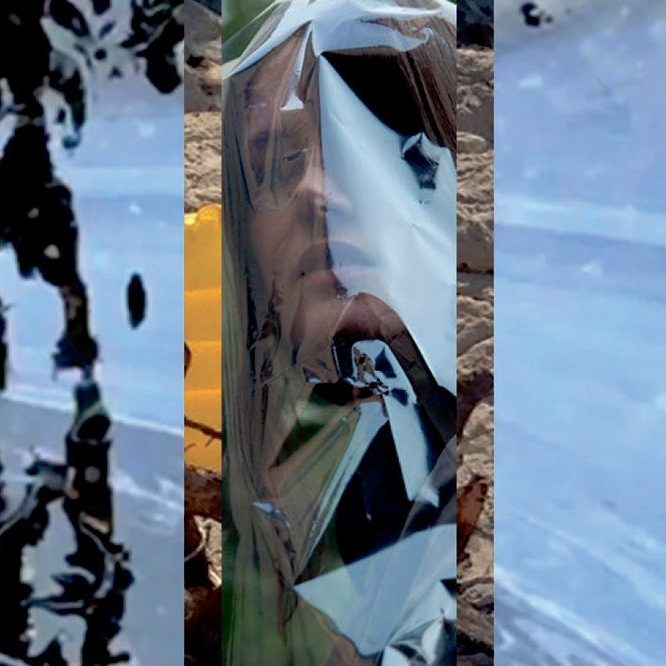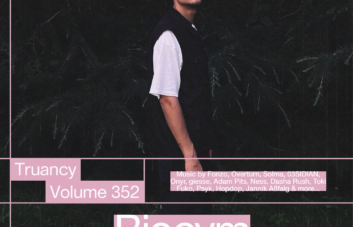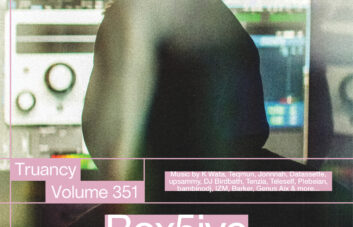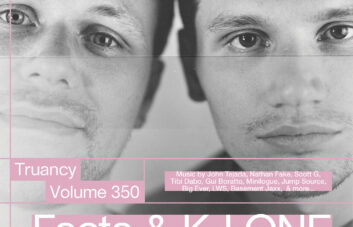Karis Zidore is an artist, dancer and choreographer who has expanded her repertoire into sound, going by the name Gel. She makes dance music in ways that you might not recognise – it’s certainly not in 4/4. Inspired by movement, she has translated her feelings into a singular expression of largely electronic sounds in the form of an album, Drama Tools. From rumbling, buzzy synths to shrieking wails of noise, thundering percussion and crisp field recordings, it’s a magnificent body of work that defies easy summation. The album opens with “On”, tampered samples of guitar strums mutating into a liquid sheet of reverbed noise – a dark ominous swell. “Bodyplanes” is built around a wonky synth pattern that eludes straightforwardness, a lurching thud steady and uneasy at different points. “Here/You Go” chops up strange vocals over a skipping beat, while “Day 2” stretches out pauses of silence between dramatic, echoing chirps. Drama is the key word, the album darting from idea to idea with a sensation of breathlessness. Even the closing moments of “Day 1/Outro” feel like an introduction to new vocals that merely gives way to nothingness. We spoke to Gel about the work that went into the album’s production, what inspires her and the meaning of ‘dance music’ in 2018.
Hi Karis! Thanks for taking the time to speak to us. How are you? “I am really good, thanks. Actually last night was my release party and I had a really good night. PANXING and Xenia Xamanek played some of their amazing music, and I got to play stuff from the album aswell. It was a real pleasure.”
Your album is fascinating. Could you describe the process of putting it together? “Thanks a lot! Well its been a long process – Drama Tools consists of sounds I’ve recorded the last five years, and then morphed and molded quite a lot. The more intensified composing has been over the last year.
“All the sounds are recorded on my computer microphone or my phone, and most of the sounds from Drama Tools are recorded 4-5 years ago in my old living room late at night in my pajamas, zoning in after days of dancing in big groups. That’s how I work best. Sort of hanging out with myself.
“When I compose I almost never work with the grid, except for one track on the album. For the rest, I either play on my midi controller or record loops of samples, that go in and out of sync, and then I cut out sections and build up beats like that.”
Your music sounds different from anything else I’ve heard lately, and even then no two tracks really sound alike – it’s very easy to just replay the album again. Where does it come from? “I am happy to hear that. As also hinted above here, I tend to compose from this private sphere, hanging out with myself. I guess I compose as an continuation of a certain state of mind, and using my intuition quite a lot. Constructing and de-constructing beats and rhythms fits in to that intuitive place, being playful and having a quite direct bodily affect on me.
“Music is really the perfect material to transmit and trigger emotional and bodily affect. When composing Drama Tools I was really interested in investigating triggering these affects through the friction of the sounds and rhythms. And also playing a lot with unpredictability of composition. I guess this shines through quite a lot, and also what causes this lack of consistency, that you mention.”
What sort of music were you listening to while making this? “I have listened to a lot of different stuff, from Annie Lennox to Holly Herndon to Kendrick Lamar.”
“I want to create beats that go in and out of shape and bodies that go in and out of beats.” I really feel you succeeded here, the music shifts and flows in unexpected fashion. Can you explain how dance and composition go together? “Thanks a lot! For me one of the interesting connections between sound and body is what I mentioned earlier, how music can the trigger and transmit affect in the body in the most direct and ‘real’ way. I am also definitely interested in how the imperfection and body logic can transmit in to the music making. I guess that’s one of the reasons I work outside of the grid.
“It’s is funny because actually my creative praxis with music and dance is very different. As mentioned my composing originally comes from a need to have a free space for myself. Dance and choreography is something I do with others. I work within a collective structure – the artist collective Danseatelier – and the collective brain and intuition has another slowness to it because of the multiplication of eyes and bodies and thoughts. I love that as well.”
Coming from a ‘dance’ perspective, how do you feel about ‘dance music’ as a term? It’s often so formulaic but it’s unmistakable from an aesthetic point of view. How do you feel about its social function? “I guess with all categorization and defining lies a problematic of closing off in stead of opening up for potential experiences. Personally I like the term dance music, because I really like to dance to music, and I like the gestural aspect of the term, suggesting a specific way of being with the music through dancing to it. And yeah, I really appreciate it’s social function for sure. I love how, when you dance to loud music with others, you go in and out of hanging with yourself and your own groove and then syncing up with others’ groove. And yes the music obviously has this great gathering affect.”
I just read a conversation between Jlin and Klein, and they said something interesting about the way people respond to certain kinds of electronic music performers:
KLEIN: “It’s so funny, I feel like proper electronic bros, they watch shows, and they’re very proper, they deep it, they’re thinking—”
JLIN: “Totally analyzing the whole performance and I’m like—”
KLEIN: “It’s just like, listen mate, just live your life, shake a shoulder!”
Do you think dance music is too cerebral? “That’s a super funny observation they have there, and I know exactly what they mean. And yeah actually I agree. Music definitely has this amazing potential to give experiences, that are not just analytical. Creating moods, emotions and unforeseen grooves. I think the problem is that we are so used to dealing with ‘understanding’ and analyzing everything from a very rational perspective, that we sometimes tend to miss out on the experiencing. And I mean the experiencing can take many different shapes and expressions for sure.. Personally I can’t stand still if I listen to dance music that affects me.”
What was the last thing that made you dance? “My four-year-old niece today. She’s a really great dancer and choreographer. The last music that made me dance must have been “Sure” by Jada. That’s a really good track to groove around to when you are hanging with yourself at home.”
Gel – Drama Tools is out now on NESM. Buy here.




